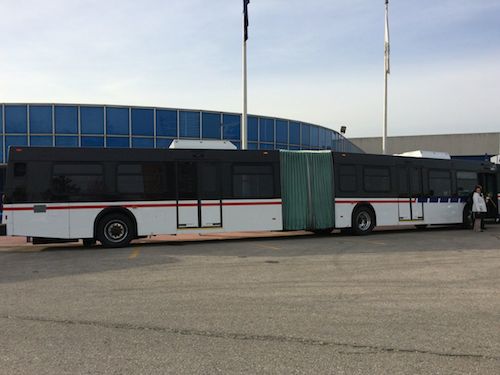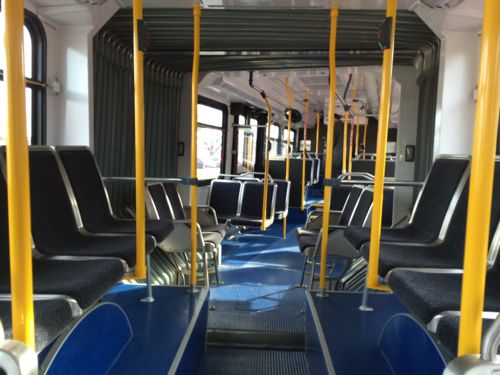Articulated Buses Now Operating On #70 MetroBus Route
Yesterday Metro began operating rebuilt buses they recently purchased:
For the first time in more than 20 years, a new kind of Metro public transit vehicle will be put into service in St. Louis. Beginning Monday, June 9, 60-foot articulated buses that pivot or bend in the middle will serve the #70 Grand Line, which is the region’s busiest bus route. These rebuilt buses are the most cost effective way to ease overcrowding by adding more passenger capacity. (Metro via email)
Metro allowed the media to take a peak at the first of these articulated buses back in March. In a poll in April readers were supportive on Metro’s decision to buy rebuilt equipment, see Readers: Metro’s Decision to Buy 15 Reconditioned Articulated Buses Green & Frugal


I didn’t get to Grand yesterday to ride one, but I hope to soon. In the past I avoided the #70 (Grand) route because it was always so crowded. Note that not all buses on the #70 are articulated, once all 15 are delivered to Metro then all on Grand will be articulated.
Any of you ride or see these yesterday? Initial thoughts?
— Steve Patterson
I think it is great, I have rode them in Chicago
I have not been on one yet, but driving behind one the other day just reinforced my believe that we need a much more enhanced, rapid transit line for Grand. Yes, they have more capacity than regular buses, but they still are slow as heck. Having dedicated lanes may be possible in some stretches but difficult in others, but even just a decent BRT route with limited stations with pre-boarding would be a huge step forward.
Smart Card technology will speed up the boarding process.
Only if Metro completely eliminates cash fares. Showing a pass to the operator, now, takes less time than swiping one (and waiting for electronic validation) will take in the future. The three big advantages come from a) those riders willing (and able) to pre-load their fares, instead of dropping coins, b) potentially, creating more distance-based fares, potentially generating more revenue and reducing fraudulent use, and c) generating better data on where riders are actually going (yes, big brother-ish) to adjust routes and service. Low income, transit dependent, unbanked riders are the ones who would benefit the most from both current pass and discounted fare programs and from future smart cards, but are also the ones least likely to have the financial resources to take advantage of them.
Huh? As a regular rider I can tell you cash payment takes considerable more time than swiping a current pass and validating a future smart card.
I agree, cash payments do take longer. But as long as Metro continues to accept them, they will continue to slow down the boarding process. Are you assuming that smart cards will completely eliminate the cash option? While Metro would probably like to see cash go away, they are, by definition, a retail entity and cash will continue to be a part of their operation for the foreseeable future.
From a rider perspective, a smart card is much like a dedicated debit card. It requires that you a) obtain a card, b) retain possession of (and can locate when needed) the card, and c) have the financial resources (extra cash) to pre-load the card for future trips. With cash, you don’t need to do any of these, and if cash is tight (as in being poor and, likely, transit dependent) cash may be the better (only?) answer, even if you could save 10% or 20% by budgeting “better”.
I fully expect Metro to virtually eliminate cash payment, the paper transfers will be going away. Systems much larger than Metro have done so, no reason if won’t work here.
CTA in Chicago still takes cash but I rode numerous bus lines on my two visits this year and nobody used cash. Metro’s new fare boxes require those using coins to deposit them one at a time — very time consuming.
I’ve witnessed first hand buses in Chicago fill with passengers, 100% using their Ventra card. But that’s anecdotal, here’s the research:
“The purpose of this study was to identify the effects of payment methods on transit speed and performance, and specifically, to conduct a comparative study of how dwell time differs for each payment method. The paper demonstrates how cash payments cause an unnecessary delay to the user as well as passengers and the system as whole. The research provides a coefficient for each payment variable which can then be applied to ridership figures to produce total route dwell time. The formula can be applied to every route across the network. This paper also provides an image of how dwell time can be reduced by switching cash users to a smart-card system.”
http://www.nc-ite.org/images/files/Different%20Payment%20Methods%20Impact%20on%20Transit%20Speed%20and%20Performance.pdf
I agree with everything you say about why cashless / smart cards “make sense” from the operations side. Eliminating cash fares will be a board decision and subject to public input. I’m sure that Schnucks, the postal service and Church’s Chicken would also all love to eliminate cash, as well, but that’s not the world we live in (yet?). We’ll just have to wait and see how long it takes Metro to say “no” to cash . . . .
They’ve already said the existing passes, tickets, and transfers will be eliminated. Metro doesn’t need to say no to cash, users will use the cards because they’re easier & faster than cash. If they want a transfer, they’ll need a smart card!
Hopefully, but still too many stops. I’d like to see a brt with enhanced stops every .5 miles or so. This could be a supplement to slower “local” service if needed.